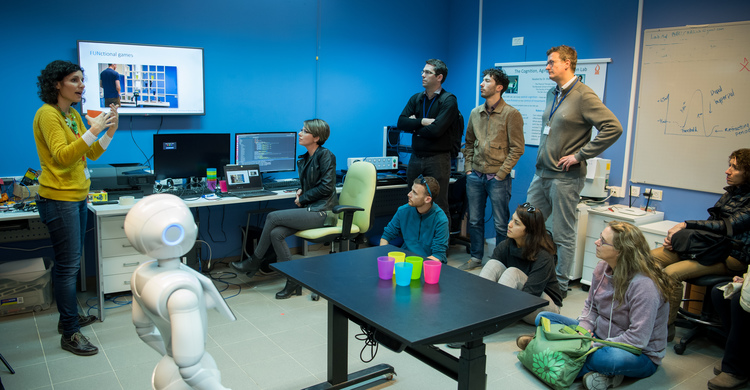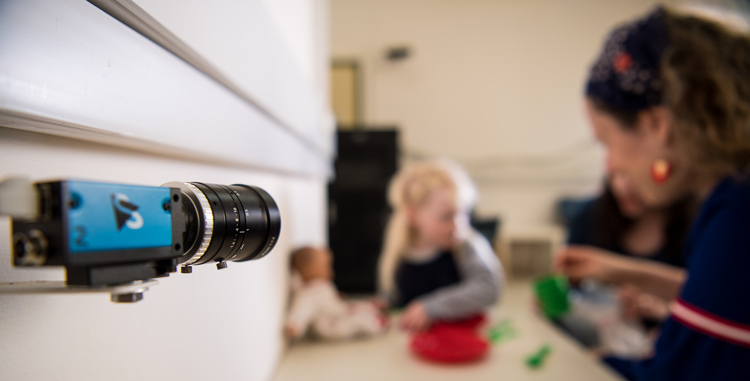In keeping with BGU's mission to advance the Negev, the FOHS also plays a critical role in meeting the region's special healthcare needs. Our students, for example, help staff local medical facilities during the course of their studies, and many join the Negev's healthcare professionals after graduation. In this way, they not only improve the health landscape of an underserved region, but also strengthen its social and economic fabric immeasurably. Moreover, as our research yields new insights, the benefits are transferred directly to the region's populations: The Translational Neuro-Rehabilitation Research Lab, a joint effort of BGU and the ADI Negev-Nahalat Eran Rehabilitation Village, is translating neuroscience and rehabilitation research into new treatments for motor disabilities and brain injuries, providing hope to the more than 40,000 patients in the Negev who require rehabilitative care. And our S. Daniel Abraham International Center for Health and Nutrition, a world leader in dietary randomized control trials, not only takes as its subjects hundreds of individuals from the region, but also affects their assessment and treatment for cardio-metabolic disease. Through these and numerous other collaborations, BGU is both changing the face of the Negev and bringing hope to patients around the world.

A Forward-Thinking Faculty
To facilitate both bench-to-bedside research and collaboration between researchers and clinicians within the faculty, the FOHS founded ten inter-disciplinary Research Hubs. The global rise of heart disease, hypertension, and diabetes, for example, led to the establishment of the Community Aspects of Chronic Disease Management Hub, which is developing a community-based healthcare paradigm for the chronically ill. Hub members are also studying the management of chronic diseases within the community and their impact on patients' caregivers and families. Finally, the hub works closely with the Negev's communities, including the local Bedouin population, to train health professionals and family members in providing optimal home care.
The FOHS's School of Public Health also educates Israel's future leaders in the fields of public health, health promotion, and healthcare management, and has served as a key resource for the Israeli government in setting COVID-19 policies. Meanwhile, its Department of Emergency Medicine, created in response to the ongoing threat of terrorism and the need for more autonomous EMTs, offers the only academic degree program for paramedics in the country. Many of the department's graduates go on to become senior managers and educators in Israel's emergency-medicine system, shaping and enhancing this critical field. The department also makes extensive use of BGU's unique in-house simulation capabilities, unmatched in Israel for their ability to replicate specific types of procedures and injuries. The new Medical Simulation and Classroom Building, currently under construction on the Marcus Family Campus, will advance both the department's and the entire faculty's teaching capacities dramatically.

Today's Research, Tomorrow's Therapies
Researchers at the National Institute for Biotechnology in the Negev Ltd. (NIBN), which aims to accelerate BGU's translational research through to commercialization, are developing novel approaches to the treatment of cancer, neurodegenerative diseases, genetic disorders, and more. Five of NIBN's technologies have been out-licensed in the last few years, while two served as the basis for new biomedical startups and three were incorporated into bio/pharma companies' pipelines. Likewise, the Ben-Gurion Cincinnati Children's Collaboration (CCHMC) has brought researchers, clinicians, and BGU engineers together to develop pediatric medical devices, one of which—a robotics system for inserting a needle into a pediatric patient—is currently being commercialized.
BGU's ABC Robotics Initiative is also at the forefront of multi-disciplinary research and development in the neurosciences, biopsychology, and physiology. Current projects include the design of better exoskeletons through optimization-based motion prediction, the development of robotic rehabilitation training protocols for stroke patients based on motor-control theory, and the creation of novel sensors and cognitive algorithms for the prevention of unnecessary damage to patients during robot-assisted surgeries.
Finally, the Azrieli National Centre for Autism and Neurodevelopment Research, an innovative research-clinical care partnership, is creating Israel's largest multi-disciplinary database on autistic children and their families. Containing multiple types of data, including genetic samples, MRI scans, behavioral assessments, video and audio recordings, and prenatal ultrasound exams, the database is the source of dozens of studies on the causes of and early detection of autism, and holds the potential to revolutionize both basic and clinical autism research across medical and scientific fields.

Help Us Meet the Negev's — and the World's — Health Needs
As demonstrated by the recent Coronavirus Task Force, an initiative of University President, Professor Daniel Chamovitz, BGU researchers are primed to meet both local and global health challenges with practical, collaborative, and creative solutions, including a COVID-19 testing technique currently used in Israeli hospitals. By providing scholarships and fellowships to FOHS students, you can ensure that more motivated, talented individuals become Israel's next healthcare professionals. Moreover, by supporting BGU's array of biomedical and health research, you can help lead to breakthroughs and develop new treatments for the most pressing health problems of our time. And by helping to fund the recruitment of top FOHS faculty, you can ensure that we have the means to educate these students and carry out critical research, for the benefit of patients in Israel and for all patients, everywhere.

Empower us to educate tomorrow's doctors and medical researchers >>
